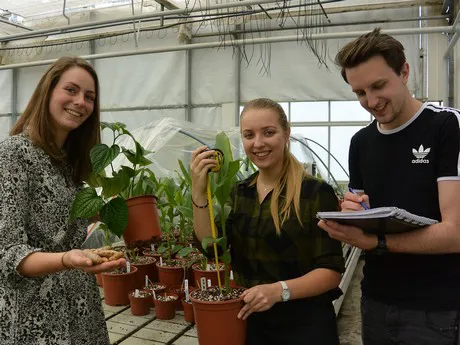To find out whether or not spices that originate from countries with a warmer climate can be cultivated in the Netherlands, a trial is going on that focuses on the cultivation of two tropical spices. The results of the first trial with turmeric and black pepper are now known and are overall positive, as is noted by the NEXTgarden Ingredient Farm.
Ingredient Farm has as its goal to explore whether or not spices that are typically cultivated in countries with a warmer climate can also be grown, bred, extracted and sold in the Netherlands. During the project, students of the HAS University of Applied Science in the Dutch ’s-Hertogenbosch will also be conducting research.
The research conducted by HAS will consist of multiple phases. The first research phase came to an end on the 30th of June, 2019, and has been conducted by Sabine Robben, Jeffrey van der Ven, and Tessa Wildenbeest. Three fourth-year Applied Biology students at the HAS. They researched the propagation and diversity of turmeric and black pepper.

Propagation
Propagation is the cause of a large amount of the spices. For the propagation of turmeric and black pepper, research was conducted to see whether both spices were able to propagate in the traditional way as well as in tissue culture cultivation. Turmeric is propagated in the traditional way through rhizomes, which are a type of root that forms underground. Black pepper is propagated through traditional cuttings. Both spices have been successfully propagated by the students this way.
Besides that, it’s important to be able to propagate the spices through tissue culture cultivation, which means to propagate plant material in a laboratory. This is done by placing a part of the plant in a test tube under sterile conditions. This is an essential factor in the cultivation of clean and disease-free plant material.
It is difficult to clean the plant material of both the turmeric and the black pepper, due to the presence of pathogens such as bacteria and fungi. Eventually, the placement of turmeric in tissue culture was a success, but for black pepper, more research is required.
Diversity
Turmeric rhizomes have also been collected from different stores in order to compare an as wide a variety as possible. Diversity is about the differences between varieties of a particular crop. It’s crucial to pick the most promising variety. The rhizomes are judged on properties such as fresh weight, length, and color, after which the rhizomes are planted in pots where they can grow into plants. During the growing period of the plants, measurements have been taken in order to determine the plants' growth rate.
After four months, the plants have been judged on certain traits both aboveground and below. All of the measurements and observations have been taken into account when determining whether or not there was diversity between the collected plant materials, which there was. One variety proved to perform well on the traits looked for above and below ground. This variety has been recommended for continued use in follow-up research.
Follow-up research
The follow-up research will start in September and will be conducted by three other students following the Horticulture and Agriculture course at the HAS. Their research will be about the cultivation of turmeric and black pepper, think of things like the right climate conditions or fertilization. After the follow-up research, another step will have been taken towards a more sustainable cultivation of turmeric and black pepper in greenhouses at Nextgarden.
The NEXTGarden Ingredient Farm project receives co-financing from the European Regional Development Fund as part of OPOost, The Economic Board and the Rabobank.
Source: NEXTgarden
